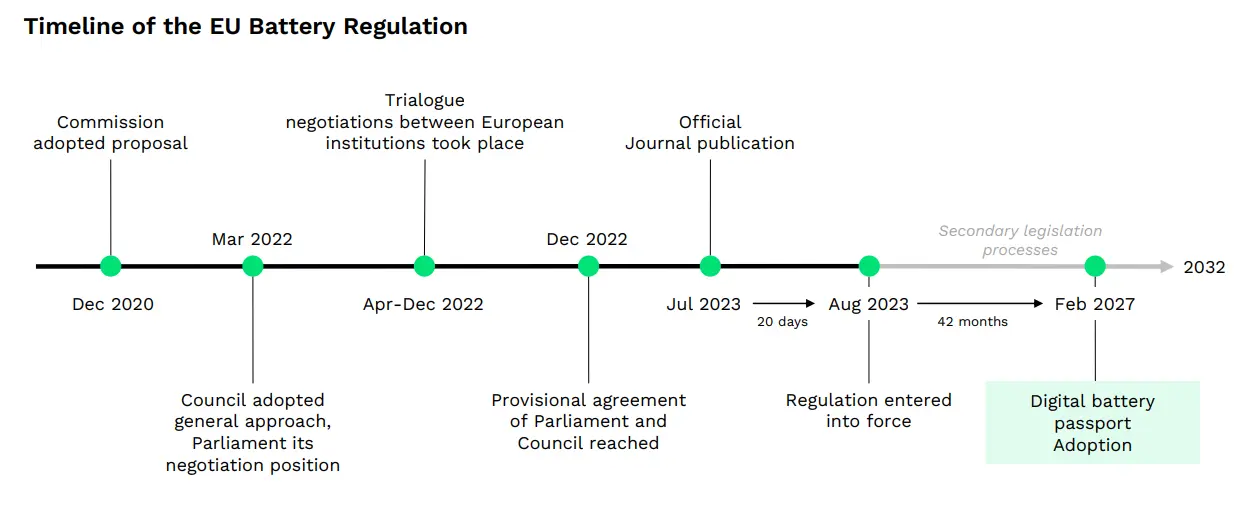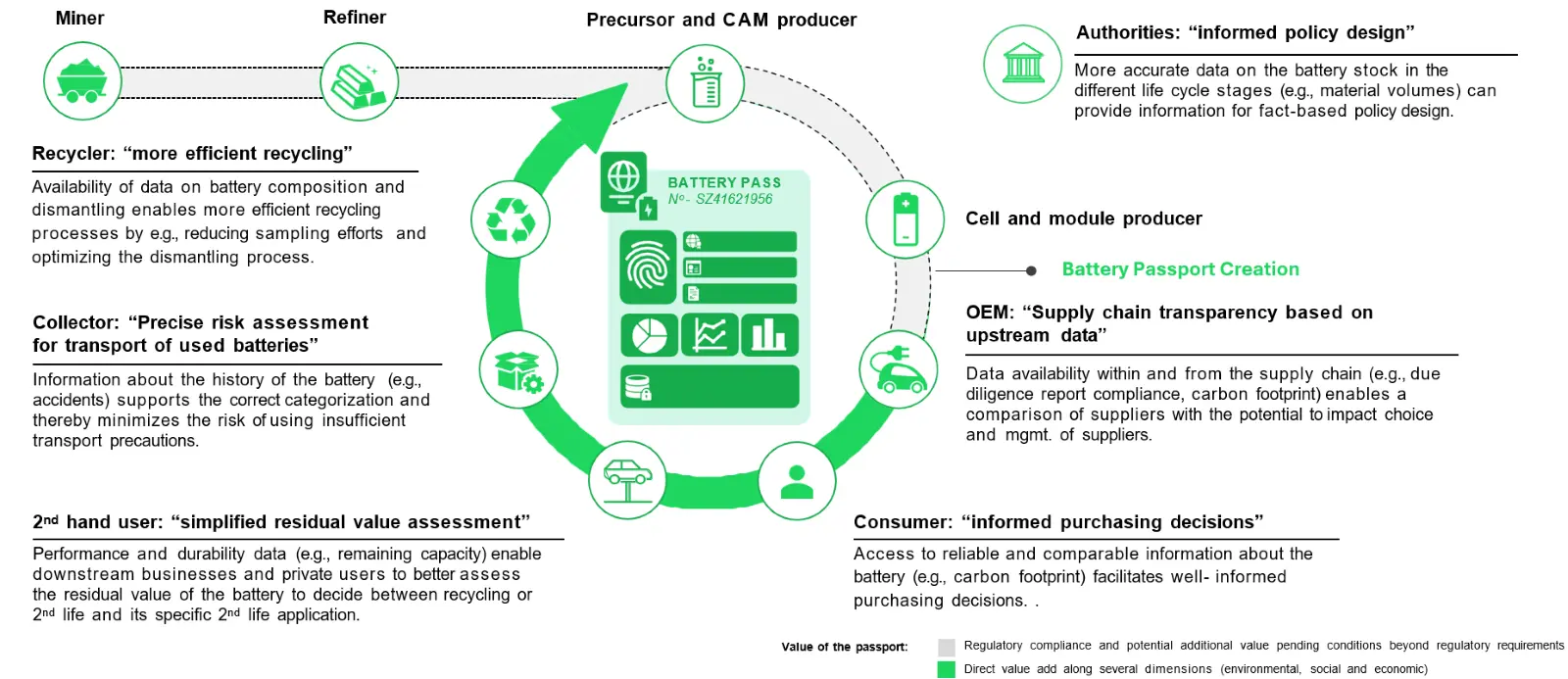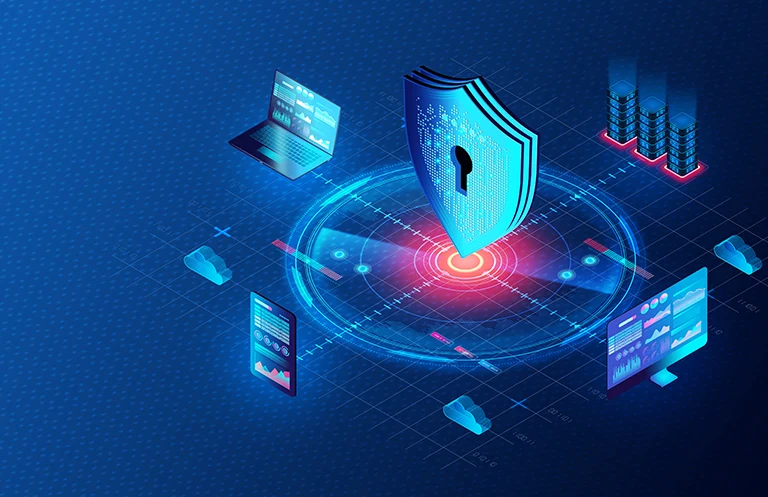Introduction to Battery Passport
What is a Battery Passport?
A battery passport is a comprehensive digital record containing detailed information about a battery throughout its entire lifecycle, from production to the end-of-life.
In 2017, the World Economic Forum (WEF) established the Global Battery Alliance (GBA) to create a sustainable battery value chain by 2030, introducing the concept of a battery passport for transparent supply chain data sharing. Building on this foundation, the European Union enacted the EU Battery Regulation (2023/1542) in 2023.
EU Battery Regulation Overview
The European Union has introduced new regulations to address the environmental impact of batteries and promote sustainable practices. Key implementation dates include:

Image Source: thebatterypass.eu
The scope of application covers batteries placed on the market or in service within the EU, affecting producers, importers, distributors, and manufacturers.
Global Initiatives and Pilots on Battery Passport
Several global initiatives are driving the development and implementation of battery passports:
- EU Battery Pass Consortium: This group is actively working on frameworks for battery passport implementation. Read more about their work here.
- Global Battery Alliance (GBA) Pilots: The GBA has conducted two rounds of pilots to test the feasibility and gather feedback on battery passports. The 2023 pilot focused on supply chain sustainability, while the 2024 pilot expanded to real-world testing and additional ESG indicators.
- International Adoption: Countries like the US, UK, Japan, China, and India are exploring similar concepts.
The Need for Battery Passports
The urgency for implementing battery passports comes from several critical factors that address both environmental and economic challenges in the battery lifecycle. Here are the main reasons why battery passports are essential:
- Sustainable Innovation: Building the future battery value chain on multi-stakeholder responsibilities and developing business models that operate on value creation, capture and conservation.
- Resource Management: Ensuring responsible sourcing of raw materials like lithium and cobalt through better traceability.
- Recycling: Helping to recover valuable materials, promoting a circular economy and reducing waste.
- Transparent Operations: Providing transparency in practices and the impact of the battery along the value chain to all relevant stakeholders in the battery value chain.
- Regulatory Compliance: Simplifying the adherence to battery production and disposal regulations with standardized documentation.
- Circular Economy: Enable the shift from linear to circular economies by keeping the product within the system to save resources. Provide awareness for batteries in circular business models.
Battery Passport and Its Value Across the Battery Ecosystem:

Image Source: thebatterypass.eu
Components of a Battery Passport
A battery passport contains several crucial elements:
- Unique Identification: Each battery must have a unique serial number and QR code for easy access to information
- Basic Characteristics: This includes production date, battery type, model, chemical composition, and intended use
- Performance and Durability Data: Technical information over the battery lifecycle, updated by parties conducting repairs or repurposing
- Carbon Footprint Information: Data on the carbon footprint associated with production, usage, and recycling
- Supply Chain Traceability: Information on raw material sourcing and manufacturing processes
Key Building Blocks in the Enablement of Battery Passport
Implementing battery passports requires a robust framework that delivers secure, scalable, and interoperable solutions supported by the following key innovations:
- SoH Monitoring: Advanced software development for real-time tracking of battery health and performance.
- Secure Communication: Encryption ensures safe data exchange between BMS, IoT devices, and cloud platforms, meeting EU standards.
- Cloud Platforms: Scalable solutions for consolidating battery data, offering insights and seamless integration with QR codes and blockchain.
- QR Codes: Enables secure access to lifecycle data through linked digital passports.
- Blockchain & IoT: Ensures transparent supply chain tracking, carbon footprint analysis, and recycling updates.
- Compliance Ready: Interoperable platforms aligned with EU Digital Product Passport standards for smooth integration.
The Importance of State of Health (SoH) in Battery Passports
SoH refers to the current condition of a battery compared to its original specifications when new. As batteries age, their SoH decreases, affecting their performance capabilities. Monitoring SoH provides valuable insights into remaining battery life and reliability, which is crucial for consumers and manufacturers alike.
Importance of SoH in Battery Passports
Recording the SoH within the battery passport is vital for several reasons:
- Safety and Compliance: Accurate SoH data helps ensure that batteries are safe for use and comply with regulatory standards set forth by authorities like the EU.
- Lifecycle Management: By maintaining detailed records of SoH, stakeholders can make informed decisions regarding battery maintenance, replacement, or recycling.
- Stakeholder Benefits: Various parties benefit from SoH information:
-
- Consumers can make better decisions regarding charging practices and potential warranty claims.
-
- OEMs can monitor battery performance over time to identify issues early.
-
- Transporters and insurers can assess risks associated with transporting used batteries based on their health status.
-
- Refurbishers and recyclers can quickly evaluate whether a battery is suitable for reuse or needs recycling.
eInfochips Battery Passport Service Enablement Offerings
eInfochips specializes in providing advanced solutions for battery management systems (BMS) that play a critical role in enabling comprehensive and compliant Battery Passports.
Here are several ways eInfochips can support stakeholders in effectively implementing and managing Battery Passports:
1. Cloud-based Platform Development
- Cloud infrastructure setup, database design, and API implementation for fetching battery-related data (e.g., SoC, SoH, Battery ID, User Token).
- User authentication through BMS tokens (e.g., JSON Web Tokens) for secure access management.
2. Connectivity Enablement
- Facilitates communication between the Battery Management Unit (BMU) and software via RS485 for telemetry data exchange (e.g., SoH).
- Enables secure data access through NFC-based Secure Elements and signature verification for data integrity.
3. Data Acquisition
- Captures critical battery parameters such as SoC, capacity, energy, and critical events.
- Uses I2C protocol for secure communication between the BMU controller and Secure Elements.
4. Application Development
- Full-stack development for Android/iOS applications with real-time updates on SoC and SoH metrics.
- Enhanced user experience through UI/UX design, wireframes, and analytics tools.
5. Safety Standards and Cybersecurity Implementation
- Incorporates HSE/HSM and SHE-based security for secure boot, storage, and tamper detection.
- Adheres to cybersecurity standards like SecOC, SSL/TLS, IPsec, ISO21434, and IEC62443.
6. Cloud BMS / Battery on the Cloud
- Develops a digital twin of batteries to provide real-time data for anomaly detection, aging analysis, and predictive maintenance.
- Offers dashboards, alerts, and notifications for better monitoring and reporting.
Utilizing technologies like IoT, blockchain, and secure communication protocols, eInfochips delivers end-to-end solutions that empower stakeholders to embrace sustainable battery lifecycle management while ensuring compliance with upcoming EU regulations.
Conclusion
As more countries are adopting similar frameworks, a global standard could emerge, further aligning with sustainability goals and promoting circular economy practices. With the 2027 EU deadline approaching, proactive preparation by stakeholders is essential to realize the long-term environmental and industrial benefits of a circular battery ecosystem.
eInfochips’ expertise spans Battery Management Systems (BMS) development, including hardware design, software integration, and cloud-based monitoring. We ensure compliance with evolving standards, such as the EU battery passport requirements, while integrating secure communication channels for real-time data access.












